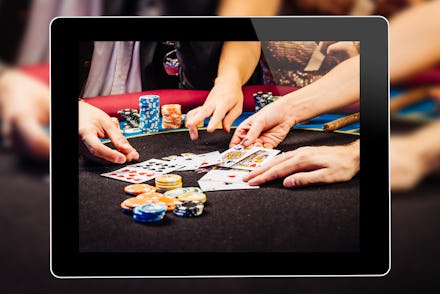How quarantine got me hooked on internet poker

Thanks to quarantine, time has melted into an amorphous ooze. It's almost impossible to identify distinct segments of the past five months. The circumstances have made for any number of amateur hobbyist, from first time yogis to at home bread-makers. It also drove a legion of new and old poker players to online platforms en masse. For me, this began as a casual weekly Texas Hold’em game with some college friends over Zoom, before sharply veering into a daily ritual with strangers.
In Pennsylvania, where I live, online gambling was legalized just over a year ago, and has already seen a boom in revenue. According to a report from Pokerfuse, online poker in the state of Pennsylvania generated $5.2 million in revenue this April — more than double its previous monthly record last December. The pandemic has given casino-style websites that are legal in a handful of U.S. states a sizeable boost. June has traditionally been the lowest month on record in neighboring New Jersey, but both states exceeded any pre-pandemic month this year with over $3 million in revenue.
I've played online poker on a near-consistent basis for the better part of 10 years, and made no effort to actively improve for nine of them. Like most inexperienced players, I’d go in on way too many hands prior to the flop, generally playing any hand with a card higher than a jack, or suited, or connected, regardless of position. This was all wrong, and I still have it all wrong, but now in fewer and less easily detectable ways to other players.
Thanks to the boredom brought on by the pandemic, I started playing small public games on the website PokerStars. Games capped at $10 maximum buy-ins. The environment of online poker is nothing like the more socially focused internet pastimes like Animal Crossing or Words With Friends. With online poker, it’s hard to extrapolate much from the player on the other side, beyond their city, general playing style, or stray references to area codes within their state. You’ll get some with pokerisms like Bluffosaurus Rex for a username or, in one alarming case, the guy whose avatar was the St. Louis lawyer who waved an assault rifle at Black Lives Matter protesters. All in all, nobody’s here to make friends, or even to necessarily improve their game.
“The thing about poker is everyone’s really, really bad and doesn’t know it,” says Christian Holden, a poker player based in Worcester, Mass. Holden, who also fronts the beloved emo band The Hotelier, began playing seriously in 2016, as the band prepared to release its most recent album Goodness. The band would often play what Holden considered to be a successful show, and then they’d hit the casino and single-handedly take home more than the entire band’s net from the gig. “How is it that I’m considered an expert in this field and I’m not getting paid nearly as much as I am where I’m not an expert? So that’s what got me to start playing poker a lot more,” they said.
The surge in activity isn't without its obvious costs for more inexperienced players. Just as going to a casino in-person every night would be concerning behavior, visiting a virtual casino on a nightly basis, compounded with the stresses of a pandemic and economic crisis, is certainly not the healthiest for those who aren’t fully in control. As someone with obsessive compulsive behaviors and a tendency to dive headlong into new activities, this isn’t the best practice to sustain for too long — even if the games are small and the cumulative losses don’t exceed double digits.
That puts a lot of people who are at high risk for process based addictions like gambling to lose their control because there’s not much that might stop them
Although I never reached the threshold in financial or behavioral liability to be considered a problem gambler, the pandemic has created a uniquely dangerous set of conditions for gambling addiction. A recent journal entry by the National Council on Problem Gambling calls for timely research to assess the extent of correlation, citing past financial crises in Greece and Iceland that exacerbated problem gambling. “When facing an unforeseen situation with confinement, fear of disease and financial uncertainty for the future, problem gambling may be an important health hazard to monitor and prevent during and following the COVID-19 crisis,” the report reads.
Dr. Stefan Kantrowitz, an addiction medicine physician and Fellow for the American Society of Addiction Medicine, has encountered an uptick in substance abuse coinciding with home gambling among patients. In addition to running comorbid with drug or alcohol addiction, problem gambling tends to disproportionately afflict people with neurological conditions, such as obsessive compulsive or attention deficit disorders. “You can be in a lockdown quarantine situation forever and have direct access to gambling means and facilities in the comfort of your home,” Dr. Kantrowitz says. “And that puts a lot of people who are at high risk for process based addictions like gambling to lose their control because there’s not much that might stop them, and they’re in a position where it’s encouraged.”
As we stare down a fall and winter with near-guaranteed spikes in new cases, there’s an increased likelihood in prolonged casino closures and renewed stay-at-home orders. The cycles of heightened activity will continue to fluctuate at the post-pandemic levels, with new players forming an ever-revolving door of traffic.
“It comes in waves. Everybody moves online, and then a ton of people get their asses kicked, and they go to what’s called the poker hospital, where they take a break and don’t play for a while, and then they come out and play again," Holden says. I'm writing this a few days removed from withdrawing all the money from my PokerStars account, deleting the app from my phone and tablet, and checking myself into the poker hospital. Here's to hoping I can stay a while.